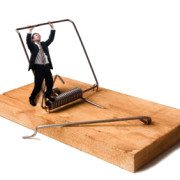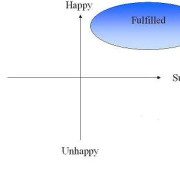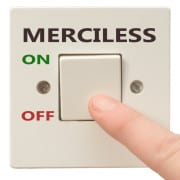Financial freedom
An anonymous email I received shortly after I began coaching haunts me. This person (I don’t know whether male or female, but I’ll assume male here) wanted desperately to leave the practice. He was responding to something I’d written, and he explained that he’d practiced law for nearly 20 years and hated it. He never liked it, even in the beginning. And yet, he wrote, he had no other choice, due to financial constraints, geography, and family expectations/requirements.
He felt destined to toil until his dying day, expecting that his stress level would keep him from living to retirement. When I wrote to ask if he’d be open to a conversation, free of charge, to see if he might have some alternatives, he thanked me but declined: his children were in college and someone had to pay those bills, he had to finance retirement on the off chance that he’d live to see it, and he had no choice other than to continue plugging away and hoping for some unknown change to make things better. It was, at the risk of being melodramatic, like a suicide note from the soul.
Fortunately, most of my clients are relatively happy in their careers and are seeking a tweak or to develop a strategy to improve their professional success and satisfaction. Even those who consider leaving the practice are upbeat about their options, though challenges do pop up along the route. I’ve noticed that some of the happiest lawyers are those who have created reasonable financial stability that allows options — in other words, financial freedom.
Is it possible to be financially free with as much as $100K in student loans, nevermind the other costs of living? Yes. It’s not only possible, it’s necessary for a sustainable career. And freedom absolutely does not require millions in the bank and no debt. It requires careful choices and attention.
One of the biggest mistakes I see in new lawyers, especially those pulling down the $160K “big firm” salaries, is living the lifestyle full out. The new BMW, the gorgeous condo, all of those nice accoutrements that seem like a fair reward for the hard work required to reach that earning level — if not purchased carefully, they turn into the proverbial golden handcuffs.
Some of the most disappointed professionals I know (this isn’t at all limited to lawyers) are those who literally bought into the lifestyle and then found it impossible to leave. Others work as hard as they can, not to advance their careers, but because they fear that if they let up even a little bit they’ll be fired. Sometimes that fear is realistic, especially in the current economy. Handling it comes through taking an objective look at the likelihood of getting fired and working to create value. Creating a contingency plan with a cushion of savings and a good network (in case a new job is in order) often helps as much or more.
Now, let’s be honest: anyone who knows me knows that I enjoy travel and impulse buys as much as the next person. I’m not urging an ascetic lifestyle, nor am I recommending the kinds of budget cuts that reduce reasonable day-to-day comfort. What I do recommend is living with enough of a financial cushion that a brief period of unemployment, whether voluntary or otherwise, wouldn’t be a catastrophe. Living the $160K (or $100K or $250K or whatever the figure may be) lifestyle requires you stay at that level of income and eliminates a host of choices that would otherwise exist.
Are you wearing golden handcuffs? What changes can you implement today to begin to build your financial freedom? And remember not to look at this question just from the perspective of what you might eliminate: business development activity may create a book of business that will give you a measure of security worthy of the investment required to get it.











Hi, Julie,
one of my first coaching clients was a high-profile attorney in the Southeast. While he was asked to come to me by his managing partner to do some “interpersonal skills” work, he told me his immediate life challenge was that he couldn’t afford to live on his one million dollar annual income.
My usual question here is, “If you can’t afford to live on (x dollars) a year, what makes you think you can live on (2x dollars) a year?….
For most folks, their expenses always rise to meet their income…so, they never get out from under…
…until they go back to square one and do some conscious, honest and self-responsible reflection on their values and life choices and whether they are more caught up in living a lifestyle (and why) rather than a life.
It is very possible for high income individuals to be enslaved by their own money, credit, or the ideology of success. For these poor souls, there appears to be a direct correlation between high debt and (false?) happiness. It is not just the wealthy however, poor people suffer the same sickness. They can often times confuse “looking rich” with “being rich” and fall into the same trap.
T